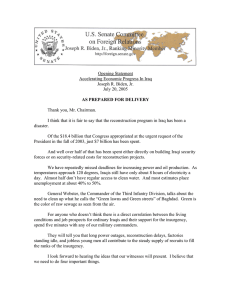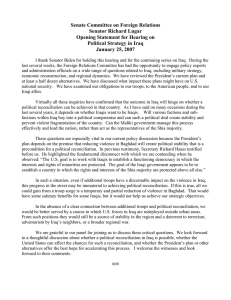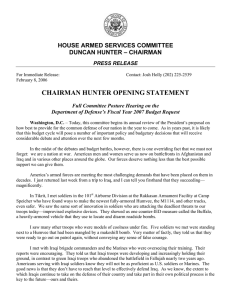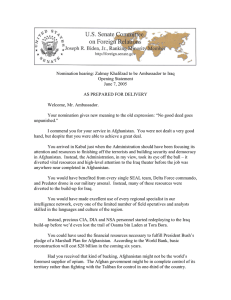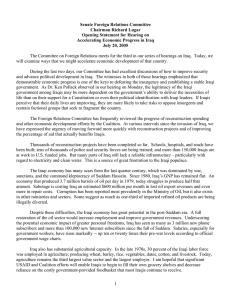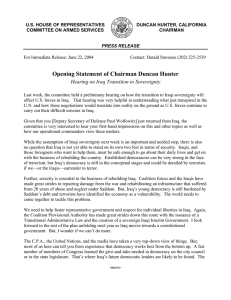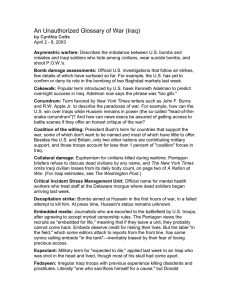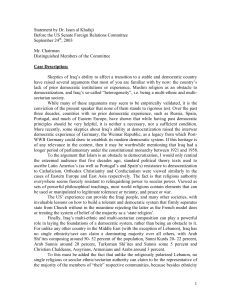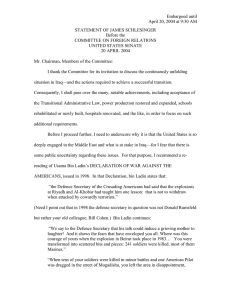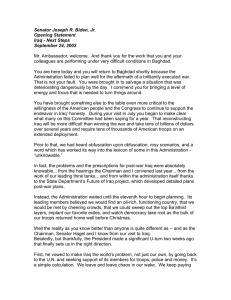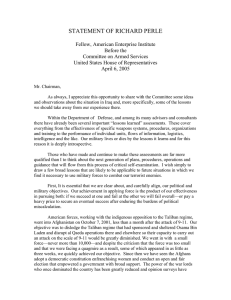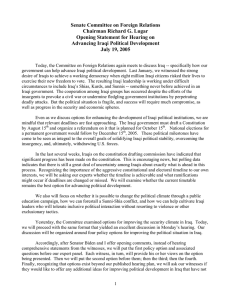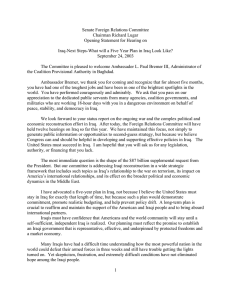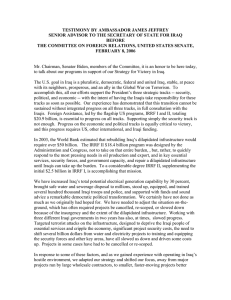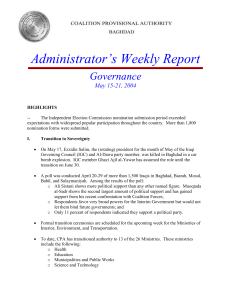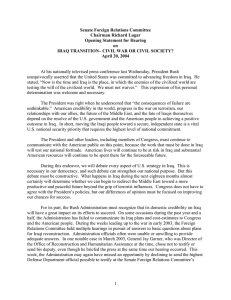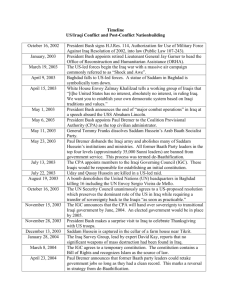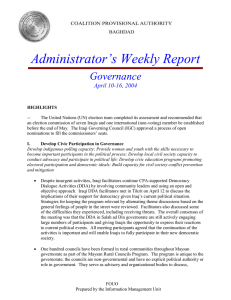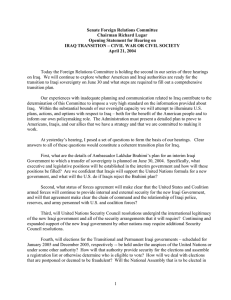Opening Statement Iraq Reconstruction Hearing Senator Joseph R. Biden, Jr. July 29, 2003
advertisement
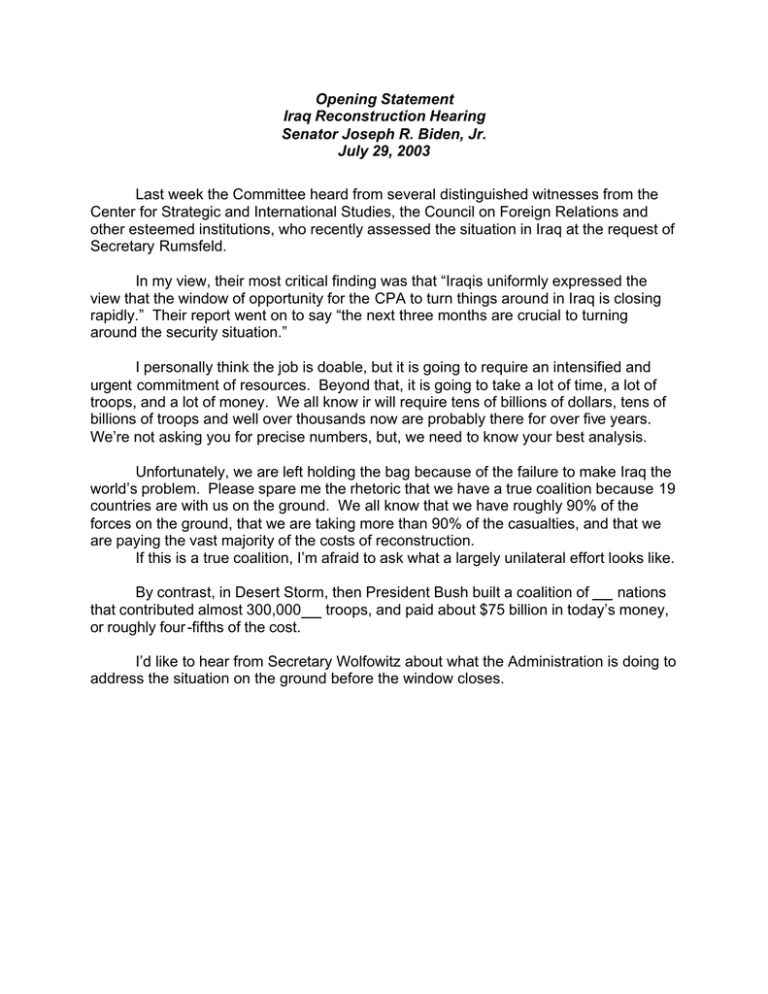
Opening Statement Iraq Reconstruction Hearing Senator Joseph R. Biden, Jr. July 29, 2003 Last week the Committee heard from several distinguished witnesses from the Center for Strategic and International Studies, the Council on Foreign Relations and other esteemed institutions, who recently assessed the situation in Iraq at the request of Secretary Rumsfeld. In my view, their most critical finding was that “Iraqis uniformly expressed the view that the window of opportunity for the CPA to turn things around in Iraq is closing rapidly.” Their report went on to say “the next three months are crucial to turning around the security situation.” I personally think the job is doable, but it is going to require an intensified and urgent commitment of resources. Beyond that, it is going to take a lot of time, a lot of troops, and a lot of money. We all know ir will require tens of billions of dollars, tens of billions of troops and well over thousands now are probably there for over five years. We’re not asking you for precise numbers, but, we need to know your best analysis. Unfortunately, we are left holding the bag because of the failure to make Iraq the world’s problem. Please spare me the rhetoric that we have a true coalition because 19 countries are with us on the ground. We all know that we have roughly 90% of the forces on the ground, that we are taking more than 90% of the casualties, and that we are paying the vast majority of the costs of reconstruction. If this is a true coalition, I’m afraid to ask what a largely unilateral effort looks like. By contrast, in Desert Storm, then President Bush built a coalition of nations that contributed almost 300,000 troops, and paid about $75 billion in today’s money, or roughly four -fifths of the cost. I’d like to hear from Secretary Wolfowitz about what the Administration is doing to address the situation on the ground before the window closes. Job number one is security. Ultimately, only the Iraqis themselves can provide for their own security, through a new Iraqi police force and a new Iraqi army. But it will take time to stand up these forces – in fact a lot longer time than most Americans have been led to believe. I saw in your op-ed yesterday that you visited the Baghdad police academy. I hope that while you were there that you received the same briefing that Senators Lugar, Hagel, and I did from the first rate police assessment team we have on the ground. If so, you probably heard the pleas to recruit over 5,000 international police forces to train and patrol with a new Iraqi police force. Where does that effort stand? You probably also heard that it will take over a year to recruit and train a minimal force of 40,000. And while Ambassador Bremer hopes to recruit another 35,000 within another year, we were told in Baghdad that fully training the force to professional standards could take several years. Similarly, it will take about three years to build an Iraqi army 40,000 strong. Meanwhile, we’re filling the vaccuum. When can Iraqis expect to have law and order improve? When can women leave their homes without fear of rape? When will Iraqis have essential public services restored? When will they hear a message effectively communicated to them? When I was in Baghdad, we were on the air just 4 hours a day. I’m told we’re doing better, but that the programming still makes public access broadcasts seem exciting. Meanwhile, Al Jazeera and the Iranians are on the air 24/7, with sophisticated programming. How can the greatest communications power in the world be on the short end of the stick here? I ask these questions because they are the yardsticks by which Iraqis are measuring our efforts. The longer it takes, the more Iraqis begin to question our ability to improve their lives and the more their frustration will grow toward the United States. And the more difficult it will be for us to create an Iraqi government that has legitimacy. Like it or not, we are now perceived as the government of Iraq by ordinary Iraqis and we will be judged by our ability to deliver the basic things that people all over the world expect of a government – security, services, and an economy that creates jobs. And in the case of Iraq, there is a huge expectations gap – Iraqis had unrealistic expectations about what the United States would deliver, but that is a reality we have to live with. So I hope Secretary Wolfowitz, that you can lay out a specific plan about how we will make progress in the coming weeks and months. I also hope you will tell us specifically what requests you have made for international assistance and what your expectations are of the contributions will be forthcoming – how many forces, what type, and how many dollars? I note that General Myers in testimony last week said of the 30,000 troops promised by other countries – “it needs to be higher than that.” What are we doing to make that number higher? Who have we made a request to? Are we considering a second UN Security Council resolution? Are we considering asking NATO to formally take over under US command? Mr. Bolten, I am pleased you have joined us today. For almost a year, the Committee has tried to get reasonable estimates on what the operation is going to cost in Iraq – in terms of securing the country, administering it and rebuilding it. I hope that you can offer some answers today. And again, please don’t waste our time and yours by saying the future is simply “unknowable.” We do not expect you to give us a precise figure, but as the government’s chief budget officer, you must have some numbers that you are using for planning. Please share them with us. The American people have a right to know. And so does Congress. I am glad to see that an interim Iraqi budget for the remainder of this calendar year has been issued. In my judgement, it does not make the scale of investments that are urgently needed to turn things around before the “window of opportunity” closes. Yet, it has a $2.2 billion deficit that will be financed from vested and seized Iraqi assets. Ambassador Bremer announced last week that next year’s budget will have a projected $4 billion deficit. That means that you must have an idea of revenues and expenditures. I hope that you will share that information with us. And I hope that you can lay out a plan for making the massive investments that Ambassador Bremer said will have to be made – over five years $13 billion to keep electricity production apace with demand, $16 billion to provide potable water, investments to improve health care, and huge expenses in building a reliable social safety net. Mr. Chairman, it strikes me that we have three options in Iraq. The first is to continue as we are now – paying the lion’s share of the cost, p roviding the lion’s share of the troops, and taking nearly all the casualties and the blame. The second is to leave quickly and let the UN deal with the ensuing chaos and let Iran and other neighbors intervene. That, in my view, would not only undermine our credibility but it would leave us far less secure than we were prior to the war. The third option is to bring in more countries, if necessary by giving them more of a say. This strikes me as the most sensible option. We should go to NATO, we should go to the UN, we should go to our Arab allies, and we should go to the EU and say that we genuinely want their help, that they have just as, if not more, at stake as we do. And that we are willing to give them more than a ceremonial role and that we genuinely want them to share the burden. I look forward to your testimony. ###


